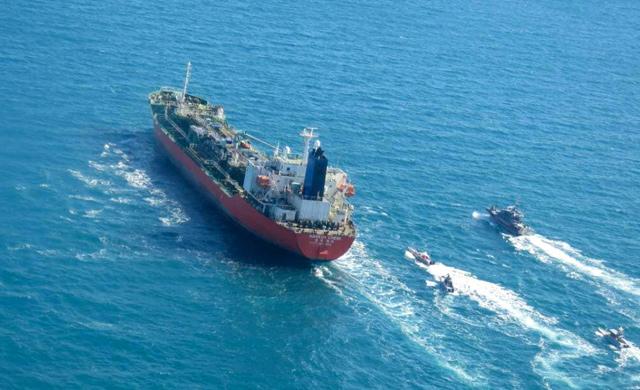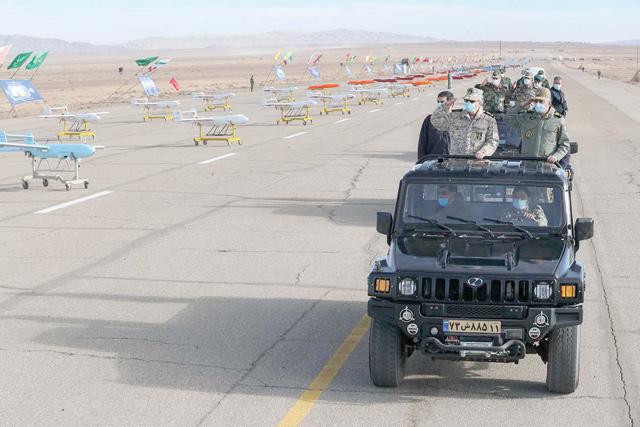You are here
Iran says 20 per cent uranium enrichment process started
By AFP - Jan 04,2021 - Last updated at Jan 04,2021

This photo obtained by AFP from the Iranian news agency Tasnim on Monday, shows the South Korean-flagged tanker being escorted by Iran's Revolutionary Guards navy after being seized in the Gulf (AFP photo)
TEHRAN — Iran has started the process to enrich uranium to 20 per cent purity at its underground Fordow facility, state media reported Monday, going well beyond the threshold set by the 2015 nuclear deal.
It is the latest and most important suspension of nuclear commitments by Iran under the landmark deal, starting in 2019, and in response to President Donald Trump's dramatic withdrawal from the accord in May 2018, with the US imposing crippling economic sanctions on Tehran.
"The process for producing 20 per cent enriched uranium has started at Shahid Alimohammadi enrichment complex (Fordow)," government spokesman Ali Rabiei said, quoted on the website of the state broadcaster.
According to the official, President Hassan Rouhani ordered the enrichment "in recent days", and "the gas injection process started as of hours ago".
The European Union on Monday said that Iran’s enrichment programme would be a “considerable departure” from deal.
EU spokesman Peter Stano said Brussels would wait until a briefing from the director of the UN’s IAEA nuclear watchdog later Monday before deciding what action to take.
On December 31 Iran informed the UN nuclear watchdog, the International Atomic Energy Agency (IAEA), that it would begin producing uranium enriched to up to 20 per cent purity, the level it had before the nuclear deal was reached.
According to the latest IAEA report available, published in November, Tehran was previously enriching uranium to levels greater than the limit provided for in the 2015 Vienna agreement (3.67 per cent) but not exceeding the 4.5 per cent threshold, and still complied with the agency’s strict inspection regime.
But there has been turmoil since the assassination in late November of Iranian nuclear physicist Mohsen Fakhrizadeh.
In the aftermath of the attack, blamed on Israel, hardliners in Tehran pledged a response and the conservative-dominated parliament passed a bill “for the lifting of sanctions and protection of the Iranian people’s interests”.
The bill also called for the production and storage of “at least 120 kilogrammes per year of 20 per cent enriched uranium”, and also mandates the administration to end UN inspections of Iran’s nuclear facilities, if the remaining parties to the deal — Britain, China, France, Germany and Russia — do not facilitate Iran’s oil sales and guarantee the return of the proceeds.
Before the bill became law, Rouhani slammed it as “detrimental to the course of diplomatic activities”.
But the Guardian council, which arbitrates disputes between the parliament and the government, approved the bill into law last month.
Iranian officials, including foreign minister Javad Zarif, had said the government will comply with the parliament’s decision.
Quoted by the government’s website, Rabiei said that the administration’s stance towards the law is clear, “but the government considers itself bound to carry out the law”.
The government has signalled a readiness to engage with US President-elect Joe Biden after four tense years under Trump, who reimposed and reinforced crippling sanctions on Tehran after withdrawing the US from the nuclear agreement.
Iran’s Revolutionary Guards said Monday it had seized a South Korean-flagged tanker in Gulf waters for breaking “maritime environmental laws”.
“A ship owned by South Korea was seized by our force’s (navy) this morning,” the Guards said on its website Sepahnews.
“This tanker was headed from Saudi Arabia’s Al Jubail port and was seized due to the repeated infringement of maritime environmental laws,” it added.
It identified the ship as the South Korean-flagged Hankuk Chemi, which it said was carrying 7,200 tonnes of “oil chemical products”.
News of the seizure comes amid renewed regional tensions particularly as Iran marks the first anniversary of the assassination of its revered commander Qasem Soleimani in a US drone strike in January 2020.
Related Articles
TEHRAN — Iran said on Tuesday it had stepped up its uranium enrichment at a time of heightened tensions with the United States and after it
Iran said on Wednesday it had offered ways to address foreign concerns over its underground Fordow uranium enrichment plant, hinting at flexibility on a serious obstacle to a nuclear deal with big powers as a self-imposed July 20 deadline nears.
VIENNA — Iran on Monday denied reports that it has enriched uranium up to 84 per cent, just below the 90 per cent needed to produce an atomi

















